| Listing 1 - 10 of 25 | << page >> |
Sort by
|
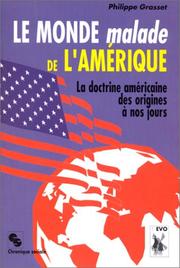
ISBN: 2870033478 9782870033470 Year: 1999 Publisher: Bruxelles: EVO,
Abstract | Keywords | Export | Availability | Bookmark
 Loading...
Loading...Choose an application
- Reference Manager
- EndNote
- RefWorks (Direct export to RefWorks)
Amerika --- Amérique --- Geschiedenis --- Histoire --- Maatschappij --- Politiek --- Politique --- Société --- National characteristics, American. --- Political culture --- Anti-Americanism. --- History. --- Political culture - United States - History.
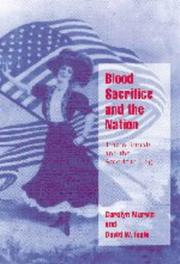
ISBN: 0521626099 0521623456 9780521626095 Year: 1999 Publisher: Cambridge: Cambridge university press,
Abstract | Keywords | Export | Availability | Bookmark
 Loading...
Loading...Choose an application
- Reference Manager
- EndNote
- RefWorks (Direct export to RefWorks)
Flags --- Political culture --- Nationalism --- Totemism --- Sacrifice --- Social aspects --- Flags - Social aspects - United States. --- Political culture - United States. --- Nationalism - United States. --- Totemism - United States. --- Sacrifice - United States.
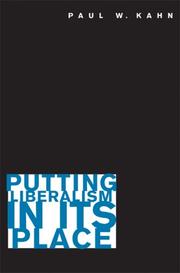
ISBN: 1282086839 9786612086830 1400826314 069113698X 0691120242 9781400826315 9781282086838 9780691136981 9780691120249 Year: 2005 Publisher: Princeton: Princeton university press,
Abstract | Keywords | Export | Availability | Bookmark
 Loading...
Loading...Choose an application
- Reference Manager
- EndNote
- RefWorks (Direct export to RefWorks)
In this wide-ranging interdisciplinary work, Paul W. Kahn argues that political order is founded not on contract but on sacrifice. Because liberalism is blind to sacrifice, it is unable to explain how the modern state has brought us to both the rule of law and the edge of nuclear annihilation. We can understand this modern condition only by recognizing that any political community, even a liberal one, is bound together by faith, love, and identity. Putting Liberalism in Its Place draws on philosophy, cultural theory, American constitutional law, religious and literary studies, and political psychology to advance political theory. It makes original contributions in all these fields. Not since Charles Taylor's The Sources of the Self has there been such an ambitious and sweeping examination of the deep structure of the modern conception of the self. Kahn shows that only when we move beyond liberalism's categories of reason and interest to a Judeo-Christian concept of love can we comprehend the modern self. Love is the foundation of a world of objective meaning, one form of which is the political community. Arguing from these insights, Kahn offers a new reading of the liberalism/communitarian debate, a genealogy of American liberalism, an exploration of the romantic and the pornographic, a new theory of the will, and a refoundation of political theory on the possibility of sacrifice. Approaching politics from the perspective of sacrifice allows us to understand the character of twentieth-century politics, which combined progress in the rule of law with massive slaughter for the state. Equally important, this work speaks to the most important political conflicts in the world today. It explains why American response to September 11 has taken the form of war, and why, for the most part, Europeans have been reluctant to follow the Americans in their pursuit of a violent, sacrificial politics. Kahn shows us that the United States has maintained a vibrant politics of modernity, while Europe is moving into a postmodern form of the political that has turned away from the idea of sacrifice. Together with its companion volume, Out of Eden, Putting Liberalism in Its Place finally answers Clifford Geertz's call for a political theology of modernity.
Communitarianism --- Liberalism --- Political culture --- Social contract. --- Social compact --- Consensus (Social sciences) --- Political science --- Sociology --- Sovereignty --- Liberal egalitarianism --- Liberty --- Social sciences --- Social structure --- Social contract --- Liberalism - United States --- Communitarianism - United States --- Political culture - United States
Book
ISBN: 0585027706 0809317508 9786613901286 Year: 2012 Publisher: Carbondale : Southern Illinois University Press,
Abstract | Keywords | Export | Availability | Bookmark
 Loading...
Loading...Choose an application
- Reference Manager
- EndNote
- RefWorks (Direct export to RefWorks)
800x600 Normal 0 false false false EN-US X-NONE X-NONE MicrosoftInternetExplorer4 In
English language -- United States -- Rhetoric. --- Environmental policy -- United States. --- Human ecology -- United States. --- Political culture -- United States. --- United States -- Economic policy -- 1945-1960 -- Environmental aspects. --- Environmental policy --- Human ecology --- English language --- Political culture --- Rhetoric --- United States --- Economic policy --- Environmental aspects.
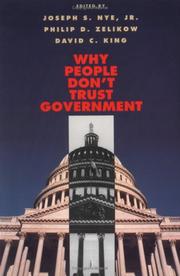
ISBN: 0674940571 9780674940574 0674275926 Year: 1997 Publisher: Cambridge (Mass.): Harvard university press,
Abstract | Keywords | Export | Availability | Bookmark
 Loading...
Loading...Choose an application
- Reference Manager
- EndNote
- RefWorks (Direct export to RefWorks)
Political participation --- Political alienation --- Political culture --- Public opinion --- Allegiance --- #SBIB:324H50 --- Politieke participatie en legitimiteit (referenda, directe democratie, publieke opinie...) --- Alienation (Social psychology) --- Political psychology --- United States --- Political participation - United States --- Political alienation - United States --- Political culture - United States --- Public opinion - United States --- Allegiance - United States
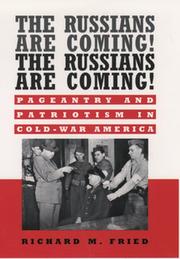
ISBN: 0195070208 9780195070200 Year: 1998 Publisher: New York (N.Y.) : Oxford university press,
Abstract | Keywords | Export | Availability | Bookmark
 Loading...
Loading...Choose an application
- Reference Manager
- EndNote
- RefWorks (Direct export to RefWorks)
Anti-communist movements --- Political culture --- Cold War --- Patriotism --- Pageants --- History --- Social aspects --- United States --- Civilization --- History. --- 20th century --- 1945 --- -Patriotism --- Anti-communist movements - United States - History --- Political culture - United States - History - 20th century --- Cold War - Social aspects - United States --- Patriotism - United States - History - 20th century --- Pageants - United States - History - 20th century --- United States - Civilization - 1945 --- -Anti-communist movements
Book
ISBN: 9780230224506 0230224504 1349309516 9786612556616 0230240895 1282556614 Year: 2009 Publisher: Basingstoke: Palgrave MacMillan,
Abstract | Keywords | Export | Availability | Bookmark
 Loading...
Loading...Choose an application
- Reference Manager
- EndNote
- RefWorks (Direct export to RefWorks)
European federation --- Political culture --- History --- European Union --- Europe --- United States --- Economic integration --- Political aspects --- Politics and government --- European federation. --- European Union. --- Political aspects. --- Political culture - United States - History - 19th century --- Europe - Economic integration - Political aspects --- United States - Politics and government - 1783-1865
Book
ISBN: 0803981767 0803981775 9780803981768 9780803981775 Year: 1989 Volume: 23 Publisher: London: Sage,
Abstract | Keywords | Export | Availability | Bookmark
 Loading...
Loading...Choose an application
- Reference Manager
- EndNote
- RefWorks (Direct export to RefWorks)
Political culture --- Culture politique --- Europe --- United States --- Etats-Unis --- Politics and government --- Politique et gouvernement --- Political culture. --- #SBIB:324H30 --- 32.01 --- 32.01 Politicologie --- Politicologie --- Culture --- Political science --- Politieke cultuur --- Council of Europe countries --- Eastern Hemisphere --- Eurasia --- Political sociology --- Political culture - Europe --- Political culture - United States
Book
ISBN: 0674058968 9780674058965 9780674048973 0674048970 9780674284333 9780674284333 067428433X 067428433X Year: 2014 Publisher: Cambridge: Harvard university press,
Abstract | Keywords | Export | Availability | Bookmark
 Loading...
Loading...Choose an application
- Reference Manager
- EndNote
- RefWorks (Direct export to RefWorks)
"[This book] reinterprets the American political tradition from the colonial period to modern times, placing issues of race relations, immigration, and presidentialism in the context of shifting notions of empire and citizenship. Today, while the U.S. enjoys tremendous military and economic power, citizens are increasingly insulated from everyday decision-making. This was not always the case. America, [the author] argues, began as a settler society grounded in an ideal of freedom as the exercise of continuous self-rule?one that joined direct political participation with economic independence. However, this vision of freedom was politically bound to the subordination of marginalized groups, especially slaves, Native Americans, and women. These practices of liberty and exclusion were not separate currents, but rather two sides of the same coin. However, at crucial moments, social movements sought to imagine freedom without either subordination or empire. By the mid-twentieth century, these efforts failed, resulting in the rise of hierarchical state and corporate institutions. This new framework presented national and economic security as society?s guiding commitments and nurtured a continual extension of America?s global reach. [The author] envisions a democratic society that revives settler ideals, but combines them with meaningful inclusion for those currently at the margins of American life."
Frontier and pioneer life --- Liberty --- Imperialism --- Political culture --- Democracy --- Hegemony --- Hegemonism --- Political science --- Sociology --- Unipolarity (International relations) --- History. --- United States --- Politics and government. --- Territorial expansion. --- Annexations --- Government --- History, Political --- Frontier and pioneer life - United States --- Liberty - History --- Imperialism - History --- Political culture - United States - History --- Democracy - United States - History --- Hegemony - United States - History --- Etats-Unis --- United States - Politics and government --- United States - Territorial expansion
Book
ISBN: 110866735X 1108591671 1108754260 1108497292 1108739725 9781108739726 9781108497299 9781108667357 Year: 2019 Publisher: Cambridge: Cambridge university press,
Abstract | Keywords | Export | Availability | Bookmark
 Loading...
Loading...Choose an application
- Reference Manager
- EndNote
- RefWorks (Direct export to RefWorks)
"Can America Govern Itself? brings together a diverse group of distinguished scholars to analyze how rising party polarization and economic inequality have affected the performance of American governing institutions. It is organized around two themes: the changing nature of representation in the United States and how changes in the political environment have affected the internal processes of institutions, overall government performance, and policy outcomes. The chapters analyze concerns about power, influence, and representation in American politics, the quality of deliberation and political communications, the management and implementation of public policy, and the performance of an eighteenth-century constitution in today's polarized political environment. These renowned scholars provide a deeper and more systematic grasp of what is new and what is perennial in challenges to democracy at a fraught moment"--
United States --- Politics and government. --- Government --- History, Political --- Political planning - United States --- Representative government and representation - United States --- Polarization (Social sciences) - Political aspects - United States --- Political culture - United States --- United States - Politics and government - 21st century --- Political planning --- Representative government and representation --- Polarization (Social sciences) --- Political culture
| Listing 1 - 10 of 25 | << page >> |
Sort by
|

 Search
Search Feedback
Feedback About UniCat
About UniCat  Help
Help News
News